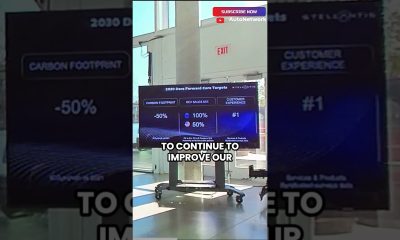Business
Lincoln Continental, the Car of Presidents, is Returning

A Lincoln Continental concept car is shown at the New York International Auto Show, Monday, March 30, 2015, in New York. Thirteen years after the last Continental rolled off the assembly line, Ford Motor Co. is resurrecting its storied nameplate. The production version of the full-size sedan goes on sale next year. (AP Photo/Mark Lennihan)
DEE-ANN DURBIN, AP Auto Writer
DEARBORN, Mich. (AP) — Elvis Presley had one; so did Clark Gable. It was even the sedan of presidents. Then the name vanished amid an invasion of newer luxury cars from Europe and Asia.
Now, the Lincoln Continental is back.
Thirteen years after the last Continental rolled off the assembly line, Ford Motor Co. is resurrecting its storied nameplate. The new Continental debuts in concept form at this week’s New York auto show. The production version of the full-size sedan goes on sale next year.
After more than a decade of toying with alphabetical names like LS and MKS to be more like its foreign rivals, Ford’s 98-year-old Lincoln brand is embracing its heritage. It’s a measure of the growing confidence at Lincoln, which is finally turning around a decades-long sales decline. And it’s a nod to the importance of China, where customers know the Continental name and appreciate brands with a rich history.
Ford CEO Mark Fields says the Continental always represented the best of Lincoln. Resurrecting it sets higher expectations, both within the company and outside of it.
“When we get a chance to work on an iconic nameplate like that, it’s a mixture of pride and a mixture of fear, because when you put that name out there, it’s got to deliver,” Fields told The Associated Press in a recent interview.
The Continental was born in 1938, when Henry Ford’s son Edsel commissioned a convertible he could use on his spring vacation. Thrilled by the reception he got as he drove the elegant sedan around Palm Beach, Edsel made the Continental part of Lincoln’s lineup.
The Continental soon became the pinnacle of American luxury. Warner Brothers gave Elizabeth Taylor a 1956 Continental with a custom paint color to match her eyes. A darker historical note: John F. Kennedy was riding in the back of a 1961 Continental convertible when he was assassinated in Dallas.
Continental sales peaked in 1990 at 62,732. But after that, Lincoln’s sales began slipping.
Ford had acquired other luxury brands such as Jaguar and Volvo. Lincoln’s designs got dull and failed to stand out from lower-priced Fords. The Continental was also squeezed by competition from the midsize Lincoln LS, which debuted in 2000, and the bigger Town Car.
Ford also underestimated the threat posed by German rivals, who were expanding their lineups, and newer Japanese luxury brands. By 2000, Lexus was the top-selling luxury brand in the U.S.; last year, BMW was.
To make its way back, Lincoln isn’t trying to be sporty like BMW or showy like Cadillac. Instead, Fields says, it wants to give drivers an experience that is elegant and serene.
“We want folks to get into our vehicles and — for lack of a better term — chill,” Fields said.
The strategy appears to be working. Lincoln’s U.S. sales rose 16 percent last year, making it one of the fastest-growing luxury brands in the market. The midsize MKZ was the brand’s top seller.
Full-size sedans like the Continental are a tough sell in the U.S., where buyers tend to prefer midsize sedans or SUVs. U.S. sales of Lincoln’s current full-size sedan, the MKS, fell 24 percent last year.
But globally, the segment is growing, Fields says. Ford has high hopes for the Lincoln brand in China, where it’s opening dazzling new dealerships complete with waterfalls. Ford began selling Lincolns in China late last year, and plans to open more than 20 dealerships there this year.
The concept car being unveiled Monday in New York is painted a deep Prussian blue, an homage to Continentals of the 1950s and 1960s. But there are few other references to its history.
Lincoln’s split-wing grille, a feature that dates to the 1940s, has been replaced by a tight, rectangular mesh grille, its shiny chrome patterned with tiny versions of Lincoln’s rectangular logo. The sides are smooth; even the door handles are hidden within a narrow strip of chrome at the beltline.
The concept is a technology showcase. The driver’s seat has a patented split cushion, so if the driver holds one leg out further than another, it will support each leg separately. The moonroof glass turns opaque with the touch of a button. Another button automatically moves the front passenger seat forward and fully reclines the rear passenger seat. That’s another nod to China, where luxury car owners often have their own drivers.
Under the hood is a 3-liter V6 EcoBoost engine that’s unique to Lincoln. Ford isn’t yet revealing more details, like whether the car is front- or rear-wheel drive. The Continental switched to a front-wheel-drive sedan in the 1980s, but many of its current competitors — the Infiniti Q70, Mercedes Benz S-Class and Lexus LS — are rear-wheel drive.
The Continental is expected to replace the seven-year-old MKS, which currently sits atop Lincoln’s car lineup.
Copyright 2015 The Associated Press. All rights reserved. This material may not be published, broadcast, rewritten or redistributed.
Bay Area
State Controller Malia Cohen Keynote Speaker at S.F. Wealth Conference
California State Controller Malia Cohen delivered the keynote speech to over 50 business women at the Black Wealth Brunch held on March 28 at the War Memorial and Performing Arts Center at 301 Van Ness Ave. in San Francisco. The Enterprising Women Networking SF Chapter of the American Business Women’s Association (ABWA) hosted the Green Room event to launch its platform designed to close the racial wealth gap in Black and Brown communities.

By Carla Thomas
California State Controller Malia Cohen delivered the keynote speech to over 50 business women at the Black Wealth Brunch held on March 28 at the War Memorial and Performing Arts Center at 301 Van Ness Ave. in San Francisco.
The Enterprising Women Networking SF Chapter of the American Business Women’s Association (ABWA) hosted the Green Room event to launch its platform designed to close the racial wealth gap in Black and Brown communities.
“Our goal is to educate Black and Brown families in the masses about financial wellness, wealth building, and how to protect and preserve wealth,” said ABWA San Francisco Chapter President LaRonda Smith.
ABWA’s mission is to bring together businesswomen of diverse occupations and provide opportunities for them to help themselves and others grow personally and professionally through leadership, education, networking support, and national recognition.
“This day is about recognizing influential women, hearing from an accomplished woman as our keynote speaker and allowing women to come together as powerful people,” said ABWA SF Chapter Vice President Velma Landers.
More than 60 attendees dined on the culinary delights of Chef Sharon Lee of The Spot catering, which included a full soul food brunch of skewered shrimp, chicken, blackened salmon, and mac and cheese.
Cohen discussed the many economic disparities women and people of color face. From pay equity to financial literacy, Cohen shared not only statistics, but was excited about a new solution in motion which entailed partnering with Californians for Financial Education.
“I want everyone to reach their full potential,” she said. “Just a few weeks ago in Sacramento, I partnered with an organization, Californians for Financial Education.
“We gathered 990 signatures and submitted it to the [California] Secretary of State to get an initiative on the ballot that guarantees personal finance courses for every public school kid in the state of California.
“Every California student deserves an equal opportunity to learn about filing taxes, interest rates, budgets, and understanding the impact of credit scores. The way we begin to do that is to teach it,” Cohen said.
By equipping students with information, Cohen hopes to close the financial wealth gap, and give everyone an opportunity to reach their full financial potential. “They have to first be equipped with the information and education is the key. Then all we need are opportunities to step into spaces and places of power.”
Cohen went on to share that in her own upbringing, she was not guided on financial principles that could jump start her finances. “Communities of color don’t have the same information and I don’t know about you, but I did not grow up listening to my parents discussing their assets, their investments, and diversifying their portfolio. This is the kind of nomenclature and language we are trying to introduce to our future generations so we can pivot from a life of poverty so we can pivot away and never return to poverty.”
Cohen urged audience members to pass the initiative on the November 2024 ballot.
“When we come together as women, uplift women, and support women, we all win. By networking and learning together, we can continue to build generational wealth,” said Landers. “Passing a powerful initiative will ensure the next generation of California students will be empowered to make more informed financial decisions, decisions that will last them a lifetime.”
Business
Black Business Summit Focuses on Equity, Access and Data
The California African American Chamber of Commerce hosted its second annual “State of the California African American Economy Summit,” with the aim of bolstering Black economic influence through education and fellowship. Held Jan. 24 to Jan. 25 at the Westin Los Angeles Airport Hotel, the convention brought together some of the most influential Black business leaders, policy makers and economic thinkers in the state. The discussions focused on a wide range of economic topics pertinent to California’s African American business community, including policy, government contracts, and equity, and more.

By Solomon O. Smith, California Black Media
The California African American Chamber of Commerce hosted its second annual “State of the California African American Economy Summit,” with the aim of bolstering Black economic influence through education and fellowship.
Held Jan. 24 to Jan. 25 at the Westin Los Angeles Airport Hotel, the convention brought together some of the most influential Black business leaders, policy makers and economic thinkers in the state. The discussions focused on a wide range of economic topics pertinent to California’s African American business community, including policy, government contracts, and equity, and more.
Toks Omishakin, Secretary of the California State Transportation Agency (CALSTA) was a guest at the event. He told attendees about his department’s efforts to increase access for Black business owners.
“One thing I’m taking away from this for sure is we’re going to have to do a better job of connecting through your chambers of all these opportunities of billions of dollars that are coming down the pike. I’m honestly disappointed that people don’t know, so we’ll do better,” said Omishakin.
Lueathel Seawood, the president of the African American Chamber of Commerce of San Joaquin County, expressed frustration with obtaining federal contracts for small businesses, and completing the process. She observed that once a small business was certified as DBE, a Disadvantaged Business Enterprises, there was little help getting to the next step.
Omishakin admitted there is more work to be done to help them complete the process and include them in upcoming projects. However, the high-speed rail system expansion by the California High-Speed Rail Authority has set a goal of 30% participation from small businesses — only 10 percent is set aside for DBE.
The importance of Diversity, Equity and Inclusion (DEI) in economics was reinforced during the “State of the California Economy” talk led by author and economist Julianne Malveaux, and Anthony Asadullah Samad, Executive Director of the Mervyn Dymally African American Political and Economic Institute (MDAAPEI) at California State University, Dominguez Hills.
Assaults on DEI disproportionately affect women of color and Black women, according to Malveaux. When asked what role the loss of DEI might serve in economics, she suggested a more sinister purpose.
“The genesis of all this is anti-blackness. So, your question about how this fits into the economy is economic exclusion, that essentially has been promoted as public policy,” said Malveaux.
The most anticipated speaker at the event was Janice Bryant Howroyd known affectionately to her peers as “JBH.” She is one of the first Black women to run and own a multi-billion-dollar company. Her company ActOne Group, is one of the largest, and most recognized, hiring, staffing and human resources firms in the world. She is the author of “Acting Up” and has a profile on Forbes.
Chairman of the board of directors of the California African American Chamber of Commerce, Timothy Alan Simon, a lawyer and the first Black Appointments Secretary in the Office of the Governor of California, moderated. They discussed the state of Black entrepreneurship in the country and Howroyd gave advice to other business owners.
“We look to inspire and educate,” said Howroyd. “Inspiration is great but when I’ve got people’s attention, I want to teach them something.”
Activism
Oakland Post: Week of April 17 – 23, 2024
The printed Weekly Edition of the Oakland Post: Week of April 17 – 23, 2024

To enlarge your view of this issue, use the slider, magnifying glass icon or full page icon in the lower right corner of the browser window. ![]()
-

 Activism4 weeks ago
Activism4 weeks agoOakland Post: Week of March 27 – April 2, 2024
-

 #NNPA BlackPress4 weeks ago
#NNPA BlackPress4 weeks agoCOMMENTARY: D.C. Crime Bill Fails to Address Root Causes of Violence and Incarceration
-

 #NNPA BlackPress4 weeks ago
#NNPA BlackPress4 weeks agoFrom Raids to Revelations: The Dark Turn in Sean ‘Diddy’ Combs’ Saga
-

 #NNPA BlackPress4 weeks ago
#NNPA BlackPress4 weeks agoCOMMENTARY: Lady Day and The Lights!
-

 #NNPA BlackPress4 weeks ago
#NNPA BlackPress4 weeks agoMayor, City Council President React to May 31 Closing of Birmingham-Southern College
-

 #NNPA BlackPress4 weeks ago
#NNPA BlackPress4 weeks agoBaltimore Key Bridge Catastrophe: A City’s Heartbreak and a Nation’s Alarm
-

 #NNPA BlackPress4 weeks ago
#NNPA BlackPress4 weeks agoBaltimore’s Key Bridge Struck by Ship, Collapses into Water
-

 #NNPA BlackPress4 weeks ago
#NNPA BlackPress4 weeks agoBeloved Actor and Activist Louis Cameron Gossett Jr. Dies at 87


















































